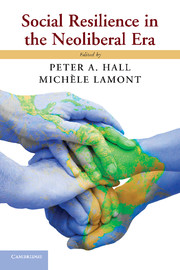Book contents
- Frontmatter
- Contents
- Contributors
- Foreword
- Prologue
- Acknowledgments
- Introduction
- Part I Neoliberalism
- Part II The Social Sources of Individual Resilience
- 4 Responses to Discrimination and Social Resilience Under Neoliberalism
- 5 Stigmatization, Neoliberalism, and Resilience
- 6 Security, Meaning, and the Home
- Part III Social Resilience on a Macro Scale
- PART IV Communities and Organizations as Sites for Social Resilience
- Index
- References
4 - Responses to Discrimination and Social Resilience Under Neoliberalism
The United States Compared
Published online by Cambridge University Press: 05 May 2013
- Frontmatter
- Contents
- Contributors
- Foreword
- Prologue
- Acknowledgments
- Introduction
- Part I Neoliberalism
- Part II The Social Sources of Individual Resilience
- 4 Responses to Discrimination and Social Resilience Under Neoliberalism
- 5 Stigmatization, Neoliberalism, and Resilience
- 6 Security, Meaning, and the Home
- Part III Social Resilience on a Macro Scale
- PART IV Communities and Organizations as Sites for Social Resilience
- Index
- References
Summary
Members of stigmatized groups often live with the expectation that they will be overscrutinized, overlooked, underappreciated, misunderstood, and disrespected in the course of their daily lives. How do they interpret and respond to this lived reality? What resources do they have at their disposal to do so? How are their responses shaped by neoliberalism? How can responses to stigmatization foster social resilience?
This chapter enriches our understanding of social resilience by considering whether and how stigmatized groups may be empowered by potentially contradictory contextual forces – more specifically, by cultural repertoires that enable their social inclusion. We consider repertoires to be social scripts, myths, and cultural structures and that the content of these repertoires varies to some extent across national contexts (Lamont and Thévenot 2000). We also consider that certain repertoires can foster resilience by feeding the capacity of individuals to maintain positive self-concepts; dignity; and a sense of inclusion, belonging, and recognition. We argue that societies provide individuals with different means for bolstering their identity and building resilience. This is accomplished by making available repertoires that are fed by national ideologies, neoliberalism, and narratives concerning the collective identity of their groups.
- Type
- Chapter
- Information
- Social Resilience in the Neoliberal Era , pp. 129 - 157Publisher: Cambridge University PressPrint publication year: 2013
References
- 26
- Cited by

